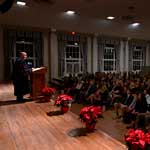

At Gettysburg College, exploration happens beyond the classroom through research, hands-on learning, and creative pursuits. This is true for students and faculty alike. In the time they have outside of preparing students through instruction and mentorship, our faculty are pursuing new concepts in their academic areas of expertise.
This year, in addition to papers in journals and other publications, 10 Gettysburg College professors published 13 major works that build upon their professional interests. These works expand across a variety of departments and disciplines, ranging from textbooks and audiobooks to novels and music.
Read the roundup below.
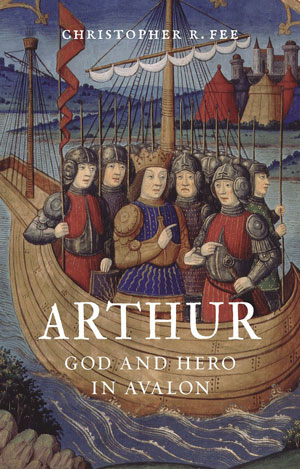 Arthur: God and Hero in Avalon
Arthur: God and Hero in Avalon
By Prof. Christopher Fee, English
What makes the legend of King Arthur so enthralling? For fifteen centuries, his legend has continued to be passed down from generation to generation. In Arthur: God and Hero in Avalon, Prof. Fee seeks to understand Arthur in terms of comparative mythology as he explores how the once and future king, King Arthur, remains relevant in our contemporary world. From ancient legend to Monty Python, the book discusses everything from the very earliest versions of the King Arthur myth to the most recent film and television adaptations, offering insight into why Arthur remains so popular—a hero whose story still speaks so eloquently to universal human needs and anxieties.
“Born in the crucible of my King Arthur course classroom and engaging a number of stalwart and indefatigable student research assistants, this lushly illustrated book seeks both to unearth the most ancient roots of the Arthurian tradition and to answer the eternal question: Why does Arthur abide?” said Fee. “Readers of this book embark on a quest to explore the manifold ways in which ancient Celtic myth and medieval Welsh folklore continue to resonate with so many of us and to have relevance in our lives today.”
 Atlantic Lives: A Comparative Approach to Early America
Atlantic Lives: A Comparative Approach to Early America
By Prof. Timothy J. Shannon, History
This second edition text provides new and expanded information for readers interested in early Atlantic and American war history. Each chapter introduces students to a topic in early American history, ranging from encounters with indigenous peoples, the slave trade, or ecological consequences of colonization, and then uses several first-person accounts to illustrate the chapter’s ideas and themes.
“I developed the first edition of this book fifteen years ago as a result of teaching History 106: The Atlantic World here at Gettysburg College, and after finding that no suitable primary source reader was available for the topic,” said Prof. Shannon. “I hope that students who read the book will be able to appreciate the common humanity of the Africans, Europeans, and Native Americans involved in American colonization and understand the wider hemispheric and trans-Atlantic contexts in which this history occurred.”
 Conjunctions and Interjections in Modern Standard Arabic
Conjunctions and Interjections in Modern Standard Arabic
By Prof. Abdulkareem Said Ramadan, Interdisciplinary Studies
Conjunctions and Interjections in Modern Standard Arabic is a grammar guide for Modern Standard Arabic, introducing conjunctions and interjections from the most basic to the most advanced, with drills for each grammatical point.
“The book provides materials for four years of study, and most likely more,” said Prof. Said Ramadan. “Skill in the use of conjunctions and interjections is essential for acquiring proficiency in expressing relationships of causation, order, time sequence, and other relationships among events and ideas.”
 Conspiracies and Conspiracy Theories in American History
Conspiracies and Conspiracy Theories in American History
Co-edited by Prof. Christopher Fee, English
This two-volume encyclopedia posits that conspiracy theories at times provide an almost mythic way of projecting order onto, and thus explaining away many chaotic and otherwise seemingly inexplicable events. It provides an in-depth, easy-to-access account of conspirators and secret organizations behind American legal, political, and financial systems, pushing to explain why millions of people are so wary of these institutions.
“I am especially proud of the fact that three Gettysburg College students received title-page credit for their hard work as assistant editors on this project, and that 22 Gettysburg students received single-author, by-line credit—in addition to payment from the publisher—for individual 1500-word entries penned on a wide variety of conspiracy topics,” Prof. Fee said.
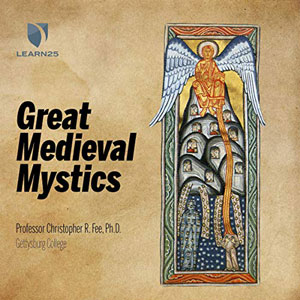 Great Medieval Mystics
Great Medieval Mystics
By Prof. Christopher Fee, English
As a profound attempt to enter into personal communion with the divine, this original audiobook defines “mysticism” as a contemplative attempt to transcend the boundaries of human existence and to participate in direct, personal communion with the divine. In the process, mystics endeavor to break the shackles binding them to earthly existence and ultimately to move beyond the realm of human thought and language.
“Developed directly from my close intellectual interaction with the lively and engaged students in my Gettysburg College course on medieval mysticism, this work attempts to assess how spiritual seekers of the Middle Ages continue to be relevant to our own 21st-century lives and beliefs,” Prof. Fee said.
 History and Collective Memory from the Margins: A Global Perspective
History and Collective Memory from the Margins: A Global Perspective
Co-edited by Prof. Sahana Mukherjee, Psychology
With research and theoretical examples from around the world, this book presents both majority and minority, powerful and marginalized perspectives on national representations of history and their various identity-relevant antecedents, meanings, and consequences. Several contributions in this book highlight the tension between engaging conflicted and negative histories with understanding the nation and the self in the present while other contributions extend this conversation to consider the impact of conflicted histories on future generations.
The idea for the book stemmed from the notion that we are a junction of what and how we remember. “I am particularly interested in global stories of identity formation and wanted to bring together authors from various regions and disciplines to examine both marginalized and dominant perspectives,” said Mukherjee. “I hope this book will be useful to anyone interested in understanding how people make sense of their group’s histories, why and how certain narratives are remembered (and forgotten), and the implications of our nation’s past for understanding present-day intergroup relations.”
 How the Body Shapes Knowledge: Empirical Support for Embodied Cognition
How the Body Shapes Knowledge: Empirical Support for Embodied Cognition
By Prof. Rebecca Fincher-Kiefer, Psychology
This book explores the role the body plays in our perceptions of the world. Using an experimental psychology perspective, Prof. Fincher-Kiefer examines a wealth of evidence, including behavioral studies supported by neuroscientific findings, which suggests that our conceptual knowledge comes from our sensory and physical experiences. Reuse of the neural pathways that were used when we initially experienced a concept, according to embodiment theory, is what constitutes thinking.
“I decided to write a book on embodiment because for years in my advanced laboratory course in cognition, I worked hard to find and organize the very new empirical research on embodied cognition,” Fincher-Kiefer said. “This theory has the potential to allow us to understand how we perceive the world in the context of our particular bodies as well as how we come to understand others’ thoughts and emotions. I hope that students and even lay persons reading this book will enjoy the experimental research that tests the hypothesis that knowledge develops out of our body’s experiences.”
 In Search of English: The History of Our Mother Tongue
In Search of English: The History of Our Mother Tongue
By Prof. Christopher Fee, English
Drawn from more than two decades of experience teaching History of the English Language at Gettysburg College, this original audiobook charts the development of the English language from its origins in the misty past all the way up to its vibrant and varied use in the modern-day, noting how constant transformation is an inherent part of any living language, and exploring how linguistic change is related to, but distinct from, historical events.
“This work suggests that the rich history of the English language is both of inherent interest and of practical use to anyone who reads, writes, or speaks it,” Prof. Fee said.
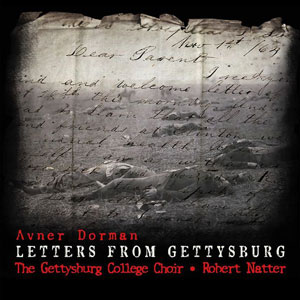 Letters from Gettysburg
Letters from Gettysburg
Composed by Prof. Avner Dorman, Sunderman Conservatory of Music
Prof. Avner Dorman casts fresh light on one of the most significant turning points in American history —the Civil War—with this five-movement work, which was created for the 150th anniversary of the Battle of Gettysburg in 2013 and internationally released in 2019. The album features performances by the College Choir and Sunderman Conservatory Profs. Robert Natter and Amanda Heim, and was inspired by letters shared with Dorman by History Prof. Peter S. Carmichael. Four of the letters were penned by a soldier, Lt. Rush Palmer Cady of the 97th New York Volunteer Infantry, who was struck by a bullet early in the battle and wrote to his family about his “good courage” against the pain. The fifth letter was written by Lt. Cady’s mother at his deathbed and delivered to his father.
“The initiative to write a piece for the sesquicentennial came from Kay Hoke, who was the director of the Sunderman Conservatory of Music at the time. I wanted to write a piece for the college choirs, which I thought were excellent, and feature some text relating to the battle,” said Dorman. “I hope people can more closely relate to the experience of a single soldier and his family around the battle and the war.”
 Power Sharing and Power Relations after Civil War
Power Sharing and Power Relations after Civil War
Co-edited by Prof. Caroline Hartzell, Political Science
While a great deal has been written about the role that power-sharing institutions play in helping to maintain the peace in countries emerging from civil wars, less is known about the effect these arrangements have on the quality of the peace. This edited volume dives into this less addressed topic by focusing on the effects that power-sharing institutions have on shaping the balance of power among a variety of actors in the aftermath of civil wars.
Prof. Hartzell’s idea for the book stemmed from the fact that power-sharing institutions are theorized to help maintain the peace following civil war by altering the balance of power among formerly warring actors. “Our hope is that people will develop a sense of the ways—both positive and negative—that power-sharing institutions, which have been identified as an important tool for securing peace in countries that have experienced civil wars, shape the nature of the peace following the end of armed conflict,” said Hartzell.
 Role Theory in the Middle East and North Africa: Politics, Economics and Identity
Role Theory in the Middle East and North Africa: Politics, Economics and Identity
Co-authored by Prof. Yasemin Akbaba, Political Science
This book examines the transformation of the Middle East and North Africa since the beginning of Arab uprisings, addressing the changing foreign policy orientations of Egypt, Iran, Saudi Arabia, and Turkey. The authors use role theory to analyze ideationally (e.g., identity, religion) and material (e.g., security, economy) sources of national role conceptions in these four regional powers.
“I have been intrigued by religion’s impact on various political outcomes connected to ethnic and religious minorities, foreign policy analysis, and political mobilization,” said Prof. Akbaba. “In this book, we are claiming a space for faith-based factors in the role theory scholarship. Hopefully, the book will generate further interest on ideational sources of national role conceptions.”
 The Veterans Treatment Court Movement: Striving to Serve Those Who Served
The Veterans Treatment Court Movement: Striving to Serve Those Who Served
By Prof. Anne S. Douds, Public Policy
This book provides a comprehensive, empirical analysis of the burgeoning Veterans Court movement. It shows how Veterans Courts seek to serve veterans’ legal, social, and psychological needs, and how they serve more than just offending veterans by allowing law-abiding veterans, many of whom suffered greatly when they transitioned out of military service, to exorcise their own demons and integrate their experiences into a socially recognized system of care. This book provides a one-stop-shop for what researchers and practitioners need to know about Veterans Courts from a 10,000-foot view.
“I do not come from a military family, and until I married my husband, who is a Marine fighter pilot, I had little exposure to military culture. Over the years, I became intimately familiar with the warrior ethos and the related culture of honor, duty, and separateness from civilian society,” said Prof. Douds.
During her time as a trial attorney in South Carolina, Douds saw how broken the military justice system was for military members who suffered from disabilities such as PTSD or Traumatic Brain Injury (TBI). She then learned about Veterans Treatment Courts. “At first blush, these non-traditional, therapeutic courts bring military personnel and veterans into a judicially monitored treatment program that provides wrap-around behavioral health services in lieu of incarceration. I hope that this book will inform the researcher-practitioner community and inspire additional research on debated aspects of these courts,” Douds said.
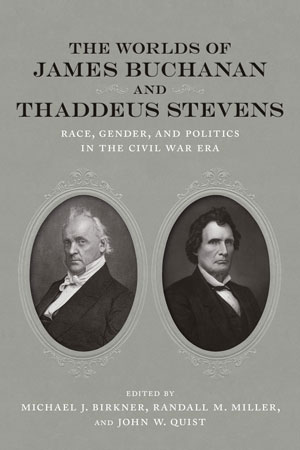 The worlds of James Buchanan and Thaddeus Stevens: Place, Personality, and Politics in the Civil War Era
The worlds of James Buchanan and Thaddeus Stevens: Place, Personality, and Politics in the Civil War Era
Co-edited by Prof. Michael J. Birkner, History
The Worlds of James Buchanan and Thaddeus Stevens examines the political interests, relationships, and practices of two of the era’s most prominent politicians as well as the political landscapes they inhabited and informed. During the 1850s, James Buchanan tried to keep the Democratic Party alive as the slavery debate divided his peers and the political system. Thaddeus Stevens, meanwhile, as Whig turned Republican, invested in the federal government to encourage economic development and social reform, especially antislavery and Republican Reconstruction. Through a series of essays by leading scholars, different aspects of place, personality and politics in the Civil War era are thoughtfully examined.
“We hope that readers would come away from The Worlds of James Buchanan and Thaddeus Stevens better informed not just about the personalities of Buchanan and Stevens, but also have a more subtle understanding of the political world they inhabited, and why it was that two men who resided within a couple of miles of one another in Lancaster, Pennsylvania, would have such divergent views on the great issues facing the U.S.A. during the antebellum period,” Prof. Birkner said.
By Kimberly Monitto ’20
Photo by Shawna Sherrell
Posted: 12/16/19


